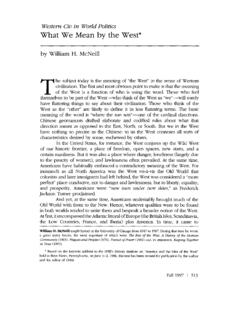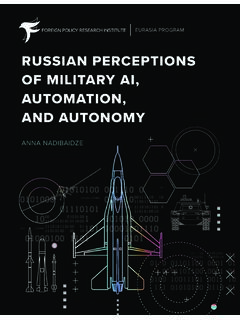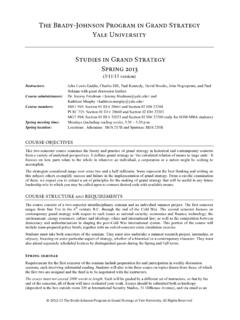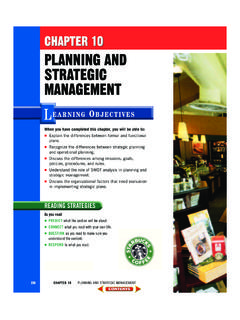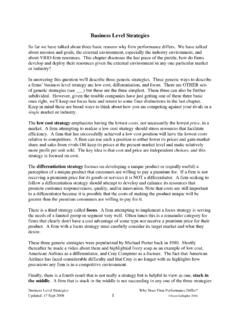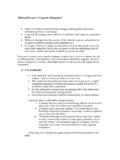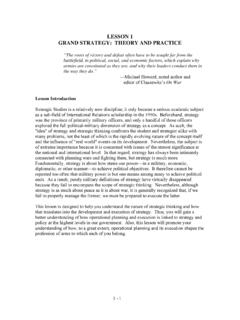Transcription of ˘ The Telegram - Foreign Policy Research Institute
1 Vol. 4 Part of the FPRI-Temple University Consortium on grand Strategy January 2011 DEFINING AND TEACHING grand STRATEGY By Timothy Andrews Sayle Tim Sayle is currently a student in history at Temple University. In 2009-2010, he was the Thomas J. Davis Fellow in Foreign Relations and Diplomacy at the Center for the Study of Force and Diplomacy, and a student in Temple's inaugural grand Strategy course taught by Richard H. Immerman and William I. Hitchcock. He is also a participant in the FPRI-Temple University Consortium on grand Strategy, which is part of the Hertog Program on grand Strategy at Temple University.
2 The program is made possible by a grant from the Hertog Foundation. grand strategy is a phrase that evokes instant and easy associations. The term immediately evokes a cast of historical actors and events: Thucydides and The Peloponnesian War, Bismarck s Realpolitik, or the grand Alliance of World War II. The phrase might also bring to mind some key texts, including Paul Kennedy s Rise and Fall of the Great Powers or John Gaddis s Strategies of Containment. The definition of grand strategy, however, is elusive, and often operates on a threshold of evidence akin to I know it when I see it.
3 It is no coincidence that several professors from Yale University are closely linked with the idea of grand strategy: For a decade, Yale has offered a renowned program in grand strategy, establishing itself as the premiere civilian university concerned with the Since 2000, courses on grand strategy have been added to the course list at other In 2010, due to philanthropist Roger Hertog s generosity, programs in grand strategy were established at Columbia University, Duke University, Temple University, and the University of Wisconsin-Madison.
4 The introduction of grand strategy to so many classrooms creates a difficult but exciting challenge for course instructors. Despite its easy and quick association, what is the definition of grand strategy? This essay argues that a working definition of grand strategy serves an important function in a course on the subject. First, it helps to organize a reading list and suggests which historical episodes or theoretical writings are suitable. Second, a working definition provides a common language and useful tool to guide classroom discussion. This is essential for a senior undergraduate course or graduate course that will tend to be self-selecting: a grand strategy syllabus often strikes the student of political, diplomatic, or military history as the holy grail of reading lists.
5 A working definition will not dampen this enthusiasm but channel it so that students and professors are able to examine broad and complex topics from a common perspective. What is grand strategy? Is there a useful definition of grand strategy that will allow for rigorous historical inquiry while also allowing students to think about the formulation of future grand strategy? How should students think about the concept of grand strategy as they approach their reading? Although the term grand strategy is decades old, it is not used frequently in Policy documents, and its salience has ebbed and flowed in academic writing since as far back as the 1920s.
6 grand strategy returned to common parlance in the 1990s as scholars and pundits competed in the Kennan Sweepstakes to define America s global role in a changing world. Newspapers, think tank publications, and Foreign Policy journals were often content to discuss grand strategy without providing a clear definition; it was easy enough to allow a search for grand strategy to stand in for all of the questions that arose as the Berlin Wall fell. In political science literature, grand strategy has been investigated more rigorously. Virtually all of these definitions are some offshoot of Basil Liddell Hart s rendering in his classic 1 In addition to Kennedy and Gaddis, Yale s Charles Hill recently published a new text, grand Strategies: Literature, Statecraft, and World Order (New Haven, CT: Yale University Press, 2010).
7 2 A quick Internet search reveals that The University of Georgia and the Massachusetts Institute of Technology both offer courses on grand strategy: grand Strategy in International Relations and Comparative grand Strategy, respectively. 3 For a bibliography of the most prominent recent writings on grand Strategy, see the extensive list in Stephen D. Biddle, "American grand Strategy after 9/11: A Reassessment." (Strategic Studies Institute , April 2005).ff. 2 Available online at The Telegram IS grand STRATEGY ONLY FOR WAR? The role of grand strategy, or simply higher strategy as Liddell Hart also referred to it, is to co-ordinate and direct all the resources of a nation, or band of nations, toward the attainment of the political object of the war.
8 Liddell Hart s definition warrants exploring in close detail. First, he argues that grand Strategy has a role and is actively used by the nation to serve a purpose. That purpose, or the political object in Liddell Hart s phrase, is a function of war and is thus defined in relation to an For Liddell Hart, grand strategy is inseparable from war. Indeed it is practically synonymous with the Policy which guides the conduct of war. 5 Many scholars have used Liddell Hart s definition profitably when studying the history of high Policy of war.
9 James McPherson, to provide a prominent example, has used the concept successfully to explain Abraham Lincoln s role as Commander-in-Chief during the Civil War. Lincoln s grand strategy, what McPherson also calls his national strategy, was the concentration of all political, economic, diplomatic, psychological and military resources to achieve the Union s Policy , or war But what value does Liddell Hart s definition have for thinking about historical periods not marked by war? Liddell Hart s definition is too narrow to stand alone for a course intended to examine more than warfare alone.
10 If Liddell Hart s explanation of grand strategy is to be carried forward with its original definition, its use must be circumscribed to major wars that require a nation to exploit its full reservoir of resources. This conception of grand strategy is problematic for two reasons. First, a course based on historical examples that fit Liddell Hart s concept of grand strategy will be limited to examples of major or total war. Two possible subjects for study, the Roman Empire and the British Empire, do not fit easily into this conceptual framework. Certainly each had many enemies, but whether either empire governed its external policies with attention to enemies to the exclusion of interests is debatable.

